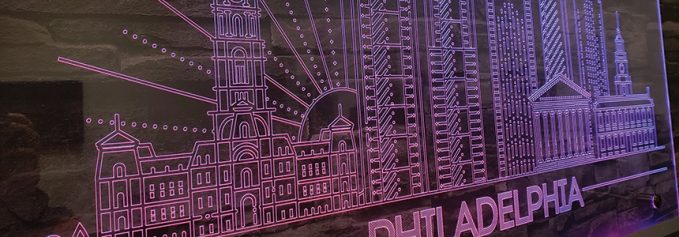
By Olivia Cahoon
For accurate repeatability, reduced turnaround, and complex shape cutting, print service providers (PSPs) invest in CNC routers, industrial cutters, laser finishers, or all-in-one solutions. These devices increase production speed while automating the finishing process.
Above: Using the 0.25-inch acrylic and the MCT VersaTech2, Printed Ink laser etches line drawing of the Philadelphia, PA skyline for a design agency based in Philadelphia. The mural’s final dimensions were 30×40 inches and included a color changing LED perimeter frame.
Super-Sized Prints
Printed Ink LLC was founded in December 2012 by Jonathan Merenlender and his father in Huntingdon Valley, PA. The commercial printer produced vinyl for wall murals, vehicle wraps, and lettering in a 2,000 square foot workspace. Collaborating with nearly 15 companies, it focused on interior environments.
After nearly four years, the PSP moved to a 6,000 square foot facility with a nationwide reach. It continued to grow its services and today operates as a commercial printer offering graphic design services, large-scale latex printing, direct to surface UV printing, ten-foot dye-sublimation (dye-sub) fabric printing and finishing, CNC cutting, and full installation services and logistics.
To house its extensive equipment portfolio, Printed Ink operates in a fully equipped 10,000 square foot facility. The PSP works with over 200 businesses including wholesale relationships with exhibit houses serving multiple clientele.
Its main application offerings include silicone edge graphics, custom acrylic laser routing, and experiential graphics with a strong focus on interior environments like wall murals, wayfinding, and fabric frames. “We love printing big things,” shares Jonathan Merenlender, co-founder, Printed Ink.
The PSP is also involved with servicing the exhibit industry. Its recent printing projects range from wrapped building graphics and festival fabric flags to custom window films for pharmaceutical spaces.
Fabric Gets Finished
Automated finishing devices like CNC routers precisely control coordination, location, and speed. In a digital printing environment, they allow PSPs to cut accurately on thick materials like metal, plastic, and wood in a short amount of time.
Printed Ink originally hand finished all of its digitally printed applications until November 2017 when it began the search for an automated router. “We researched a lot of options, as we had many things on our want list,” explains Merenlender. For example, robustness, reliability, build quality, speed, and an excellent support team were just several of the PSP’s criteria.
In October 2018, Printed Ink selected the MCT VersaTech2 with a 126×126-inch table from Gerber Technology. The shop immediately put the device to work—finding value in the dual belt technology for laser cutting fabrics, including a conveyor system and throughput for processing roll-to-roll textiles. This was important, as the shop’s fabric department was growing quickly.
“We wanted to be able to cut rolls of over 150 feet of fabric without any issues,” explains Merenlender. Additionally, the ability to laser cut acrylic was beneficial to Printed Ink as it previously outsourced this service.
The MCT VersaTech2 is an all-in-one finishing solution that operates at a maximum speed of 78 inches per second with materials up to two inches thick. It features dual conveyor technology for laser standard cutting and routing. A center driven motorized unwind unit handles roll-to-roll textiles and a sheet feeder automatically processes boards.
With this device, Printed Ink takes advantage of custom shapes, three dimensional (3D) lettering, fabrication, reduced labor, and increased capacity. However, Merenlender finds the most profound benefit of using an automated cutter is improved speed and accuracy. “Our previous finishing method was hand trimming including vinyl and rigid boards, as well as hot knifing fabric, which had two to three employees busy for eight hours a day.”
Today, the PSP reduces its labor to several hours a day on the MCT VersaTech2 with one operator and superior accuracy—allowing Printed Ink to fully produce graphics from start to finish without outsourcing any custom cutting.
Ensuring Success
Not only did Printed Ink invest in the MCT VersaTech2 for improved speeds and reduced labor, it also needed to improve its digital printing process. At the time of investment, the shop’s main motivation with the CNC router was to pair it with the EFI VUTEk FabriVU 340 dye-sub printer it employs.
“We can produce 2,400 square feet per hour in amazing quality, but could only get so far by hand trimming and hot knifing,” admits Merenlender. Using the MCT VersaTech2, Printed Ink reduced its fabric trimming time from 20 to 30 minutes to 20 to 30 seconds. “The bottleneck was immediately gone.”
The shop now employs its CNC cutter as much as possible, especially for UV and latex printing. While the majority of its finishing is completed on the device, Merenlender’s goal is to get 95 percent of Printed Ink’s work digitally finished. “We set all of our trimming on the router and save significant amounts of time.”
Finishing software is equally as important as the device—Printed Ink uses MCT’s TigerVision software. It combines vision, editing, and machine control features like anchor points, drag and drop, dynamic vacuum, fish eye camera, optimization, quick response codes, and tandem mode.
Experimenting with New Finishing Technology
Printed Ink installed its MCT VersaTech2 in December 2018. Immediately following installation, the print shop experimented with in-house finishing projects and promoted its new equipment and services to repeat clients.
Shortly after, a design agency in Philadelphia, PA approached Printed Ink for a unique entrance visual. “This customer has worked with us for many years and was excited for us to try an experiment on our new router,” shares Merenlender.
The client requested a custom mural that represented the city of Philadelphia while standing out as a centerpiece. Using 0.25-inch acrylic and the MCT VersaTech2, Printed Ink laser etched a line drawing of the Philadelphia skyline. The PSP also laser cut the acrylic and added holes to mount the mural with standoffs to the wall.
Printed Ink complemented the laser cut mural with a color changing LED perimeter frame, which caught the etching’s light and glow. The most challenging portion of the project—aside from standard learning curves with the new finishing device—was hiding the LEDs while ensuring brightness. According to Merenlender, preparing the electrical components to hide the power cables before installation also presented several challenges.
In one hour, Printed Ink produced a 30×40-inch illuminated laser etched acrylic mural. While the shop handled acrylic signage before the MCT VersaTech2, it was not able to produce laser etched acrylic in large format sizes. “Having the ability to produce it in a huge size brings some exciting and new ways to decorate interior environments including multi-layered murals with different color lighting paired with other elements such as CNC cut graphics,” offers Merenlender.
To the Next Level
While digital presses offer speed and efficiency, an automated finishing device takes production to the next level by reducing bottlenecks, expediting projects, and reducing labor. Printed Ink experienced firsthand how a CNC router helps transform a print shop’s work ethic.
“We went from doing everything by hand to having a giant digital worker who is very accurate and fast,” shares Merenlender. “Aside from the obvious benefits of custom shapes, 3D lettering, and fabrication, the CNC router drastically cut down on labor and increased capacity almost instantly.”
Apr2019, Digital Output


